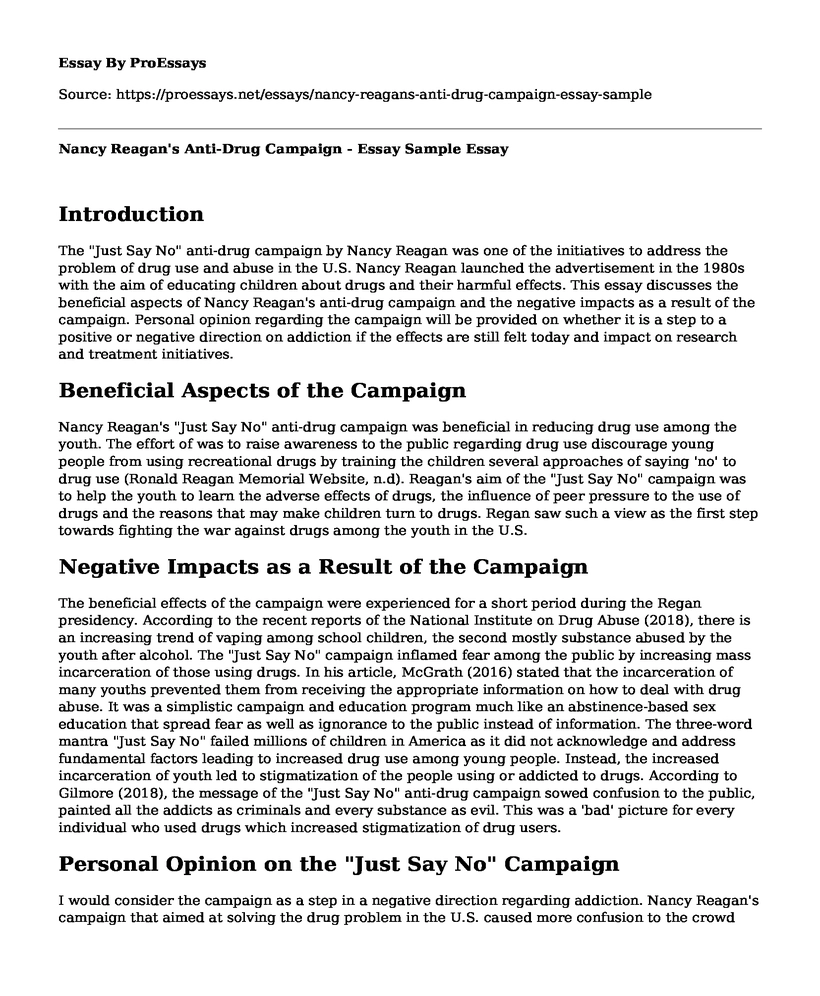Introduction
The "Just Say No" anti-drug campaign by Nancy Reagan was one of the initiatives to address the problem of drug use and abuse in the U.S. Nancy Reagan launched the advertisement in the 1980s with the aim of educating children about drugs and their harmful effects. This essay discusses the beneficial aspects of Nancy Reagan's anti-drug campaign and the negative impacts as a result of the campaign. Personal opinion regarding the campaign will be provided on whether it is a step to a positive or negative direction on addiction if the effects are still felt today and impact on research and treatment initiatives.
Beneficial Aspects of the Campaign
Nancy Reagan's "Just Say No" anti-drug campaign was beneficial in reducing drug use among the youth. The effort of was to raise awareness to the public regarding drug use discourage young people from using recreational drugs by training the children several approaches of saying 'no' to drug use (Ronald Reagan Memorial Website, n.d). Reagan's aim of the "Just Say No" campaign was to help the youth to learn the adverse effects of drugs, the influence of peer pressure to the use of drugs and the reasons that may make children turn to drugs. Regan saw such a view as the first step towards fighting the war against drugs among the youth in the U.S.
Negative Impacts as a Result of the Campaign
The beneficial effects of the campaign were experienced for a short period during the Regan presidency. According to the recent reports of the National Institute on Drug Abuse (2018), there is an increasing trend of vaping among school children, the second mostly substance abused by the youth after alcohol. The "Just Say No" campaign inflamed fear among the public by increasing mass incarceration of those using drugs. In his article, McGrath (2016) stated that the incarceration of many youths prevented them from receiving the appropriate information on how to deal with drug abuse. It was a simplistic campaign and education program much like an abstinence-based sex education that spread fear as well as ignorance to the public instead of information. The three-word mantra "Just Say No" failed millions of children in America as it did not acknowledge and address fundamental factors leading to increased drug use among young people. Instead, the increased incarceration of youth led to stigmatization of the people using or addicted to drugs. According to Gilmore (2018), the message of the "Just Say No" anti-drug campaign sowed confusion to the public, painted all the addicts as criminals and every substance as evil. This was a 'bad' picture for every individual who used drugs which increased stigmatization of drug users.
Personal Opinion on the "Just Say No" Campaign
I would consider the campaign as a step in a negative direction regarding addiction. Nancy Reagan's campaign that aimed at solving the drug problem in the U.S. caused more confusion to the crowd with a simple and vague message (Gilmore, 2018). Also, the intended information to the youth was not received as many of them were incarcerated following the violent policing and mandatory jail sentences for drug criminals during Reagan's presidency (McGrath, 2016).
I believe that the effects of the campaign are still felt today. For instance, over 50% of prisoners in the U.S. today are incarcerated for drug crimes (Gilmore, 2018). I would consider the effects of a negative perspective. The continued increase in prison penalties imposed on drug crimes has an adverse impact on addiction. The campaign and its supporting laws are focused on the treatment idea through mass incarceration for non-violent drug crimes which are still prevalent today in the U.S. However, imprisonment of drug users is not an effective treatment of addiction.
I believe that the "Just Say No" campaign detracted from the treatment/research initiatives. Instead of focusing on the fundamental factors leading to the use of drugs among the youth, drug treatment, as well as substance abuse programs, the campaign and its effects, emphasize on deterrence tactics even today (Gilmore, 2018, McGrath, 2016). Drug abstinence programs are not effective in treating drug use and abuse among the youth. The drug education through the campaign was not an honest approach supported by scientific research that provides accurate findings regarding the condition of drug use and abuse among the youth in America. In a PBS interview with Dr Herbert Kleber, the Reagan politics using the "Just Say No" campaign made it difficult to expand the treatment of drug use through research and new initiatives, only a decrease in its initiation and use were experienced (WGBH educational foundation, 2014). Therefore, this campaign detracted from addiction research and treatment initiatives.
References
Gilmore, J. (2018). "Just Say No" and its effects. Landmark Recovery. Retrieved from https://blog.landmarkrecovery.com/just-say-no-and-its-effects
McGrath, M. (2016). Nancy Reagan and the negative impact of the 'Just Say No' anti-drug campaign. The Guardian, Retrieved from https://www.theguardian.com/society/2016/mar/08/nancy-reagan-drugs-just-say-no-dare-program-opioid-epidemic
National Institute on Drug Abuse. (2018). Monitoring the Future survey: High school and youth trends. Drug Facts. Retrieved from https://www.drugabuse.gov/publications/drugfacts/monitoring-future-survey-high-school-youth-trends
WGBH Educational Foundation. (2014). Interview Dr Herbert Kleber: Drug Wars. PBS Frontline. Retrieved from https://www.pbs.org/wgbh/pages/frontline/shows/drugs/interviews/kleber.html
Ronald Reagan Memorial Website. (n.d). Nancy Reagan "Just Say No": Mrs Reagan's Crusade. Retrieved from https://web.archive.org/web/20060427235046/http://www.reaganfoundation.org/reagan/nancy/just_say_no.asp
Cite this page
Nancy Reagan's Anti-Drug Campaign - Essay Sample. (2022, Dec 09). Retrieved from https://proessays.net/essays/nancy-reagans-anti-drug-campaign-essay-sample
If you are the original author of this essay and no longer wish to have it published on the ProEssays website, please click below to request its removal:
- Rhetorical Analysis of Barack Obama's First Speech
- Rhetorical Essay on Speech "The Ballot or the Bullet"
- Paper Example on National Party Committees
- The Significance of the Family Unification Act - Essay Sample
- Speech Analysis Essay on Presidents Obama Speech at the Interfaith Prayer Service in Newtown
- Essay on Modes of Production Determine Social Relations: Marxist Theory of Historical Materialism
- Free Essay Example on Policy Background







